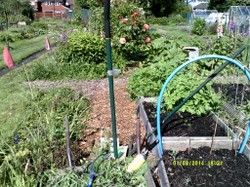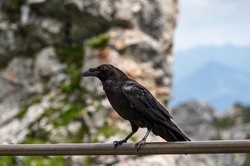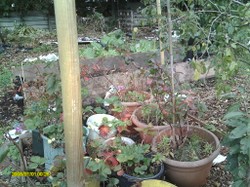Industrial agriculture exploded into life at the industrial revolution. Even in Victorian times gardeners and farmers were placing all sorts of horrid chemicals on the land. If you read The Lost Gardens of Heligan you will find that in the Victorian and Edwardiian ages strychnine and cyanide were liberally applied to gardens, and they killed much of the insect life in the ground and did no good for living creatures up the food chain. Fertilizers came next, and they were applied to the ground for a quick boost to fertility, but they did nothing for soil structure, and disproportionate use at the expense of manure led to soil erosion. In the 1940s organic growing arose to counter these aberrations.

What is organic growing?
by frankbeswick
Organics growing is a method of farming in a sustainable way.
Understanding Organics
Imagine that you have a field on which you want to grow crops. You lay down a base fertilizer, plant your crops and then later on apply fertilizer again. You do this year on year, and you notice that despite the fertilizer you are adding, you do not obtain wonderful results, and the yield seems to either be going down or you are needing more and more fertilizer to achieve your results. What has gone wrong?
The answer is that you have not been feeding the soil. Organic farmers and gardeners realize that the soil is not just an inert mass for us to tread on and grow in, but is a living reality that they call "the living soil." Thus the first requirement of being an organic grower is that you treat your soil not as something to be mined and exploited, but a living thing to be tended, nursed and nourished. The grower in the first paragraph has made the mistake of simply feeding the plants, whereas he/she should have been feeding the soil, and thus the grower transgressed the organic principle, "feed the soil that the soil can feed you."
The misguided grower had not realized that the soil needs humus. This is a complex black colloid that is formed by the decay of organic matter, and it is essential to soil health. Its complex structure retains water and minerals; its blackness holds heat; and it serves as a glue that binds soil particles together. Without humus soil loses its cohesion and can wash and blow away, a problem found on some non-organic farms in Europe and America
But organic growers are more than just sensitive to humus, they are aware that the soil contains a myriad of living creatures in interactions so complex that they are not yet fully comprehended by scientists. For this reason organic growers preserve the soil life. While they can use some pesticides in emergency, they use only out of necessity rather than routinely, and they will never use a broad spectrum pesticide that kills widely.
Green Horticulture
 | Horticulture (Green World (Chelsea House)) This book explores the wide-ranging realm of horticulture. Presenting lucidly written information on conventional, organic, and sustainable methods, author Gail Lang, Ph.D., cov... |
The Living Soil
What is soil made of? Basically, it is a mixture of mineral particles, water, organic matter in various states of decay and living creatures,who interact in a web dazzling in its complexity. Here is where the organic grower benefits from humility. Knowing that the web is so intricate that you must treat it carefully spares you from the hubris of the wielder of broad spectrum pesticides, who thinks that much soil life is pointless to him and therefore can be lightly and casually killed. Organic growers go sensitively in the world, knowing that they are part of the great web that some call Gaia, and knowing that to damage the web is to threaten their own security. Rather than kill soil creatures, organic growers encourage them.
The implication of all this is that organic growers avoid unnecessary chemicals, which can destroy soil life, and some chemicals are avoided totally.The only herbicides and pesticides that may be used are those that occur naturally in plants, such as pyrethum, a plant extract, or common kitchen substances such as essential oils, used for killing some insect pests; soft soap, for aphids; and vinegar, for some weeds. Bordeaux mixture, which is a derivative of copper sulphate has proved necessary to resist potato blight. Growers may apply to the organic certification body, in Britain the Soil Association, to use others only as an a short term emergency.
Organic growers may use fertilizer, but only as back up after soil maintenance treatments have been applied, and then organically acceptable fertilizer only, drawn from an approved list. They prefer to use manure, compost, seaweed, leaf mold etc, all naturally occurring soil enhancers.
Weeds are treated by a wide range of techniques, rather than liberally applying herbicides. Organic thinking supports the encouragement of natural predators, such as blue tits and ladybirds, which eat pest insects. On my allotment, which is run organically, I am happy for the allotment fox to predate, as it takes the wood pigeons, grey squirrels and the mice, which attack some crops. Organic growers will use manual techniques, such as flame weeders, which I use for weeds on my paths, which cannot be dug up without destroying the path; they also use manual weeding. This takes time, but the up-side of this is that the weeds can be composted and returned to the soil as a fertility aid.
Horticulture
 | Texas Organic Vegetable Gardening: The Total Guide to Growing Vegetables, Fruits, Herbs, and Othe... This book shows you how to have healthy soil and recommends environmentally safe products and even some homemade remedies to control pests and diseases in your garden. It descri... |
 | The Organic Medicinal Herb Farmer: The Ultimate Guide to Producing High-Quality Herbs on a Market... A new approach to growing local medicine, including information on geo-authenticity, wildcrafting, and developing a good business plan Both a business guide and a farming manual... |
Rotation and polycultures
Crop rotation is an essential part of organic growing. One of the most ecologically destructive techniques is monoculture, in which one plant is for several years on the same land. When this happens you notice that fertility declines and plant diseases set in, as they have an opportunity to build up in the soil. The alternative is to rotate crops year by year. The traditional English rotation was potatoes, onions/roots, legumes, brassicas, but more complex rotations can be used, dealing with cereals, beetroot, umbellifers [carrots etc] and [cucumbers, etc]. Strawberries are put into some rotations.
A critically important element is fallow. This is a traditonal technique of leaving some land free for a season. It fell out of use with intensive cultivation, inspired by the food pressures of World War Two, but the organic movement uses it, for it provides a rest for the land.
More complex rotations involve intercropping, as rows of one plant are planted next to another type. In organic gardens carrots are often planted near marigolds, which carrot root fly hate, or onions, which deter the fly with their scent. Such rotations are easier in gardens and small holdings than in large farms.
Animals are part of the system, as they provide manure. Chickens and ducks are used to deal with pests, as ducks, for instance, are great eaters of slugs. Chickens peck the ground, and they are sometimes known as a chicken tractor for their effect in weeding. If organic farmers want to clear some land they often use pigs, which are the most effective ground clearance tool known to humans. A few farmers still use horses, as they are lighter on the soil than tractors are and better on steep ground. A tractor/quadbike on steep ground can roll and kill its driver; a horse on steep ground is safer. The key to organic animal farming is that the animals are treated humanely and are allowed to live happy and natural lives before being humanely slaughtered.
Space for wildlife is left at field margins. This is not wasted land, as some might think, but allows an area for the natural predators to dwell, whereupon they venture to prey on pest species. Trees are encouraged as they provide nesting spaces for useful birds, and space in barns is allowed to encourage owls. Without encouraging useful predators organic growing would not work. Your vegetarian food is produced by lots of eager predators feeding off pests.
Organic animal farming
Taste
Does organic food taste better than non-organically produced food? Is it more nourishing than its non-organic counterpart? The issues are a sideline, as organic growing is a production method which is justified by the fact that it is a sustainable means of production, whereas the non-organic method not only is less likely to preserve soil, but is based on expensive oil-based fertilizers, which will become progressively more expensive as oil supplies lessen and then will fade out. One day organic techniques will be all that we have left, and then there will be no issue to discuss.
However, the taste of food and its nutritional content depend upon the presence of the right mixture of chemicals for each crop, and trace elements, known as micro-nutrients, are an important part of taste and nutritional value.Organic methods, applied properly, will certainly ensure that the trace elements are sufficiently present. This does not mean that non-organic crops will not be as tasty or as nutritious, for they surely can be, but it means that the organic methods are more reliable a source of food and taste than non-organic food is.
Moreover, eating is not merely ingestion of physical nourishment. There is a spiritual and moral dimension to it, and eating ethically is an integral component of this moral and spiritual dimension. When you eat organic food you know that it has been produced in an ecologically harmonious way that respects the earth and the creatures on it. For organic consumers this matters.
You might also like
Wild Fell: a wild life Warden's ExperiencesA fascinating and stimulating encounter with the natural world though the eye...
Meat versus vegetables:Full vegetarianism is a lifestyle choice, but there is a case for eating less...






 Pilgrimage. A review15 days ago
Pilgrimage. A review15 days ago
 Leo the Fourteenthon 05/09/2025
Leo the Fourteenthon 05/09/2025
 The Melsonby Hoardon 03/25/2025
The Melsonby Hoardon 03/25/2025



Comments
All seems to be as normal.
Thank you!
There also is an annual tradition, since 1951 of Norway sending to Iceland a Christmas tree for the two nations being friends! (I know from Ragnar Jónasson novels ;-D!)
Sameet Sharma mentioned in his The Christmas Tree Beef Between Norway and Iceland Has Been Squashed July 28, 2014, for Vice Media Group that Oslo notified Reykjavik and Rotterdam of no 2014 Christmas tree for them, but a Christmas tree for London, because of the $29,000 annual cost Oslo-Reykjavik.
Reykjavik Mayor Jón Gnarr objected. Oslo Mayor Fabian Stang put the tradition back into effect, at least for Reykjavik if not for Rotterdam.
Would there be any public indication of the cost Oslo-London that fortunately worked for uninterrupted gift-giving for London?
There is no royal Christmas tree, but every year Norway sends a Christmas tree to London, a large one, in thanks for what Britain did in World War two. It is displayed in Trafalgar square.
Online sources add Norway spruce to the Unitedstatesian popularest Christmas tree lists even as Scots pine appears to dominate among about 9 other best-selling traditionals.
The abovementioned species got much attention as the 2023 National Christmas Tree. It may maintain that honor for December 2024 or the National Park Service and the USDA Forest Service may niche a different cut species each year from henceforth.
The Coolidge presidential administration offered a Balsam fir (Abies balsamea) as the first National Christmas Tree, in 1923.
Would there be such a thing as a British-Isles or a royal Christmas tree species?
Yes I saw it thanks.
Thank you!
So the Norway spruce is to east-side ponders what Scots pine (Pinus sylvestris) is to west-side ponders.
(Might you have seen what the spell checker did to Picea abies in the comment box below? ;-{)
Prices babies, theNorway spruce.
The University of Georgia hosted an hour-long webinar yesterday regarding brown spot needle blight (Mycosphaerella dearnessii) and needlecast (Rhizosphaera spp) diseases.
The presenter, Dr. Caterina Villari of the forestry and natural resources school there, identified the former as particularly jeopardizing historically longleaf and Scots pine, the former a native species and the latter a "Christmas-tree" import. Brown spot needle blight presently leads to ailing loblolly pine trees in the Unitedstatesian south.
Dr. Villari listed such diseases as menacing -- albeit in lesser degrees -- some European countries.
(What tree might the British isles opt for as Christmas trees since Unitedstatesians now prefer British Isles-native Scots pine?)
I do not recognize these as diseases found in Britain to any great degree.
The second paragraph to the first subheading, Understanding organics, advises us that "Thus the first requirement of being an organic grower is that you treat your soil not as something to be mined and exploited, but a living thing to be tended, nursed and nourished."
The above information caused me to consider among tending proper lighting, sometimes advanced, sometimes hindered by grouped or scattered trees.
Needle-bearing trees count among popular shade trees even as that role is being challenged by the Unitedstatesian spread of such diseases as brown spot needle blight and as needlecast.
Might the latter two diseases be present in the British Isles?